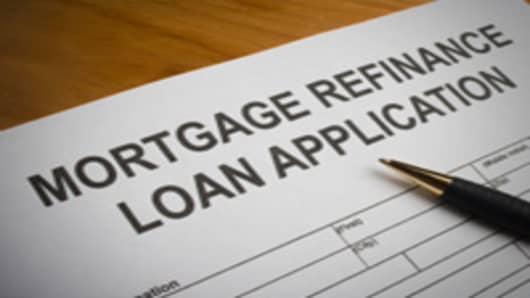Does anyone remember when the rate on the 30-year fixed mortgage was up around 8 percent? I do.
Perhaps that's why it continues to stun me that a tiny shift in our now ultra low rates can have a huge effect on consumer activity, namely refinancing. No question, it is a statement on just how tight and how sensitive our current mortgage market is today.
According to the Mortgage Bankers Association's weekly survey, "The Refinance Index decreased 9.2 percent from the previous week. The Refinance Index has decreased for 3 consecutive weeks, reaching its lowest level since May 6, 2011."
The mortgage bankers cite a jump (and by jump, I mean more like a hop) in rates on the 30 year from 4.46 percent to 4.69 percent. This is the highest rate since mid-May, they note, which I will note was just two months ago.
Yes, that's a pretty large jump, but we are still below 5! The trouble is that there is a very small pool of eligible refinancers right now, because 1) so many have already refinanced at these incredibly low rates, 2) many borrowers are still underwater on their homes, which makes them largely ineligible for super low rates and 3) many borrowers don't have enough equity or the proper credit score to get into a refi that's worth the cost.
So the refinance share of mortgage applications continues to drop. Why should we care? What we really want is to see purchase applications, because that means people are buying houses, and that number did go up a bit last week although it's still down for the month of June. But wait:
"The increase in the share of homes being bought with cash and the likelihood that the NAR's (National Association of Realtors) existing home sales data are being overestimated by between 10 percent and 20 percent means that the relationship between mortgage applications and total home sales is not as close as it once was," said Paul Dales of Capital Economics, who believes sales figures are still historically low.
But let's think for a second about what the economy gains from a refi boom? Consumers save more money, which gives them more money to spend. Saving more also gives consumers more confidence in their financial situation, which helps the economy in varied ways. Refinancing can also help some troubled borrowers avoid defaulting on their loans.
I'm not saying I want to see us go back to the days of using our homes as cash machines. I do want to go back to the days when our homes weren't draining us dry.
Questions? Comments? RealtyCheck@cnbc.comAnd follow me on Twitter @Diana_Olick



